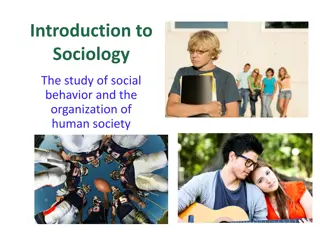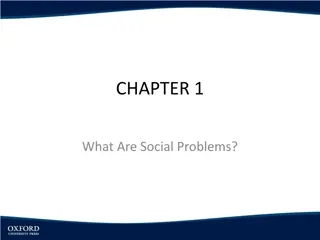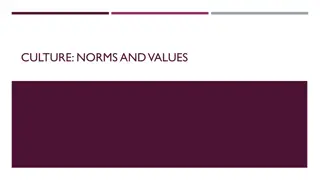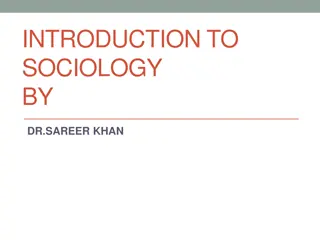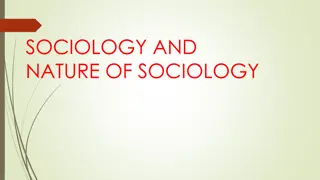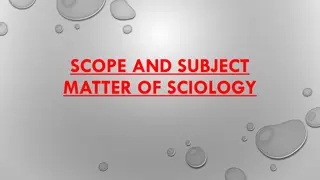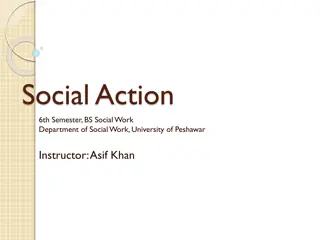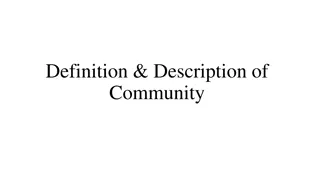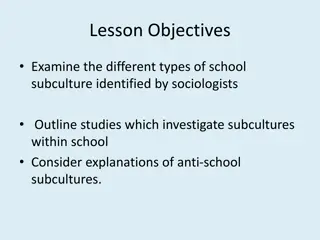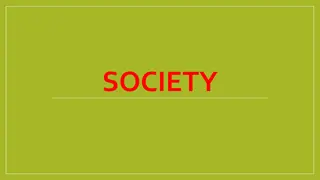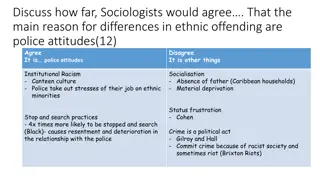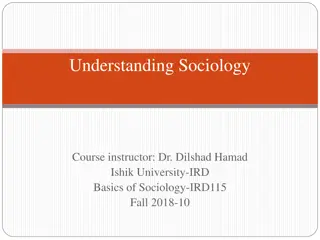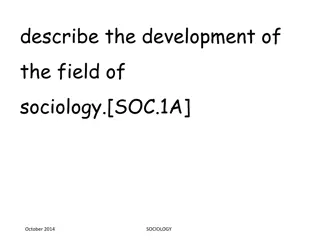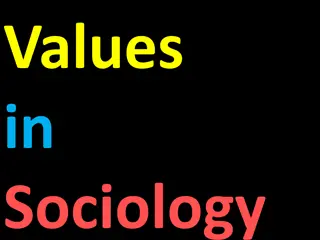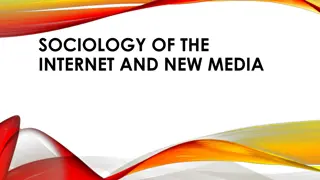Insights into Energy Transition Research and Historical Perspectives
Explore the intersection of energy transition research with historical perspectives, focusing on the importance of just transitions and the evolving relationship between history and sociology. The discussion delves into key concepts like distributive justice, the role of historians and sociologists,
9 views • 8 slides
Understanding Sociology: The Study of Social Behavior
Sociology is a broad discipline that examines human interactions, behaviors, and how they are influenced by social structures, categories, and institutions. Sociologists ask key questions to understand the connections between everyday life and societal forces. By analyzing relationships between indi
1 views • 32 slides
Understanding Social Problems: A Sociological Perspective
Social problems are conditions or behaviors that cause public concern and require collective action. Sociology, particularly in the study of social issues, aims to identify both objective elements like measurable harm and subjective elements like moral evaluations. These subjective beliefs can shape
0 views • 34 slides
Understanding Cultural Norms and Values
Sociologists define culture through norms, values, beliefs, and material objects. Norms are rules that govern behavior, with three basic types: folkways, mores, and laws. Folkways are customs without moral significance, mores are norms with moral importance, and laws are clearly defined and enforced
0 views • 15 slides
Understanding Culture in Sociology: Key Concepts and Definitions
Culture is the cornerstone of society, distinguishing humans from animals and shaping our social lives. Sociologists define culture as the shared values, practices, norms, and beliefs that govern our interactions and behaviors. This comprehensive guide explores the non-material aspects of culture, i
1 views • 30 slides
Understanding the Origins and Development of Sociology
Sociology, as the science of society, emerged in the 19th century in Europe due to factors like the Industrial Revolution and successes in physical sciences. Influential early sociologists like Auguste Comte and Herbert Spencer contributed to the foundational theories of sociology. Emile Durkheim fu
0 views • 11 slides
Understanding Sociological Theories and Frameworks
Sociological theories, encompassing micro and macro perspectives, provide a lens to interpret societal dynamics. Consensus theories like functionalism emphasize shared norms, while conflict theories such as Marxism highlight social inequalities. Social action theories like interactionism focus on in
3 views • 21 slides
Scope and Subject Matter of Sociology: An Overview
Sociology encompasses a wide range of studies, from individual interactions to global social processes. Sociologists have debated the scope and subject matter of sociology, dividing it into formal/specialistic sociology and synthetic/general sociology. Different scholars have proposed various approa
4 views • 20 slides
Elements of Social Action: Understanding Human Behavior in Society
Social action plays a vital role in analyzing human behavior within a society. Max Weber's concept emphasizes how actions influence and are influenced by others, holding subjective meanings. Talcott Parsons outlined five components: actor, objective, social situation, normative orientation, and ener
0 views • 9 slides
Understanding the Concept of Community: Definition, Description, and Elements
The concept of community, derived from the Latin word "Commune," signifies a group of people who share common modes of communication, language, habits, and more. Sociologists have various definitions, with common elements being locality, community sentiment, and a shared culture. Communities are cla
0 views • 8 slides
Historical Development of Sociology in India: Phases and Significance
The historical development of Sociology in India is explored through key phases from 1773 to 1950. The first phase, characterized by ethnographic research, laid the foundation for Sociology, Anthropology, and Indology. The second phase witnessed the growth of Sociology as a profession with empirical
2 views • 10 slides
Exploring Gender Disparities in Crime
Delve into the intricate relationship between crime and gender by examining key sociological concepts like social control, chivalry thesis, and gender socialization. Understand why men are more inclined towards drug use compared to women. Explore questions on historical crime trends and the increasi
0 views • 16 slides
Exploring School Subcultures and Their Impact
This information delves into the various types of school subcultures, including anti-school subcultures, and examines studies on subcultures within schools. It discusses the behaviors, attitudes, and statuses associated with different school subcultures and highlights the impact of these subcultures
4 views • 21 slides
Understanding Society: Key Concepts and Characteristics
Society, as defined by various sociologists such as Maclver and Wright, is a complex web of social relationships, norms, and structures. It is characterized by abstractness, mutual interaction, dynamic nature, social control mechanisms, likeness, differences, cooperation, conflict, and a continuous
5 views • 20 slides
Understanding Grounded Theory Research Design
Grounded theory research design is an inductive approach used to systematically develop theories based on data collected and analyzed. Developed by sociologists Glaser and Strauss, this methodology emphasizes staying close to the data throughout the analysis process. It involves systematic procedure
0 views • 20 slides
Role of Men and Women in Domestic Division of Labor
The domestic division of labor encompasses the roles of men and women in housework, with traditional views promoting segregated conjugal roles and newer perspectives suggesting symmetrical family dynamics. While functionalists like Parsons argue for distinct roles based on gender, feminists challeng
0 views • 70 slides
Understanding Sociological Perspectives
Sociologists employ three primary theoretical perspectives to explain how society influences young people and vice versa: the symbolic interactionist perspective, the functionalist perspective, and the conflict perspective. Symbolic interactionism focuses on symbols and face-to-face interactions, wh
1 views • 18 slides
Sociological Perspectives on Ethnic Offending, Gender Disparities, Social Class Influence, and Crime Causes
Sociologists analyze the reasons behind differences in ethnic offending, disparities between men and women in crime rates, impacts of social class on criminal behavior, and the role of relative deprivation in driving criminal activities. Factors such as police attitudes, socialization processes, mat
0 views • 10 slides
Understanding Development Theories: Modernization and Dependency
In this course on theories of development, students delve into Modernization Theory and Dependency Theory, exploring their key components, critiques, and implications. Through the lens of renowned sociologists, the course examines the transition from traditional to modern societies and its impact on
0 views • 33 slides
Explaining Crime: Sociological Perspectives and Methods
Sociologists explain crime through various theories such as Marxist, New Right, and subcultural explanations, as well as through the lens of labeling theory. They explore factors like social order, control, formal and informal rules, and the impact of societal structures on criminal behavior. Method
0 views • 10 slides
Exploring the Basics of Sociology: Understanding Society and Culture
Dive into the fundamentals of sociology with this course taught by Dr. Dilshad Hamad at Ishik University. Learn about sociological concepts, perspectives, and the significance of culture in shaping individuals and societies. Understand the differences between micro and macro sociology and gain insig
0 views • 17 slides
Evolution of Sociology: Key Figures and Societal Analysis
Explore the evolution of sociology through the contributions of leading sociologists like Auguste Comte, Emile Durkheim, and Karl Marx. Understand the impact of different types of societies, cultural elements, and societal changes. Dive into the intricate web of cultural life in the United States an
0 views • 63 slides
Exploring Values in Sociology: A Critical Analysis of Objectivity and Subjectivity
Delve into the complex interplay between objectivity and subjectivity in sociology, examining whether true value-free research is achievable. Classical sociologists like Comte, Durkheim, and Marx are scrutinized for their perspectives on the role of values in sociological inquiry, challenging the no
0 views • 17 slides
Sociology of the Internet and New Media: Impact on Social Relationships
The sociology of the Internet explores how technology has revolutionized social interactions and communication. It delves into the implications of platforms like Facebook and LinkedIn, altering how we connect, share news, and network professionally. Sociologists study the societal effects of online
0 views • 26 slides
Department of Sociology at University - Overview and Programs
The Department of Sociology was established in 2009 under the Faculty of Literature, offering courses in General Sociology, Institutional Sociology, and Applied Sociology. With a dedicated team of academic staff and a comprehensive curriculum, the department aims to train sociologists equipped with
0 views • 17 slides
Understanding Community Studies in American Sociology
Community studies in American sociology focus on analyzing life within specific neighborhoods, dating back to the 1920s. This field employs various research methods to explore social aspects extensively, building on anthropological urban ethnography. Early studies by influential figures like W.E.B.
0 views • 65 slides
Evolution of Sociological Perspectives on Social Problems
The study of social problems has evolved dramatically since the 1970s, shifting from an objectivist approach to a more subjective and constructionist perspective. This shift acknowledges that what is considered a social problem is a matter of definition, and focuses on the social processes involved
0 views • 12 slides

